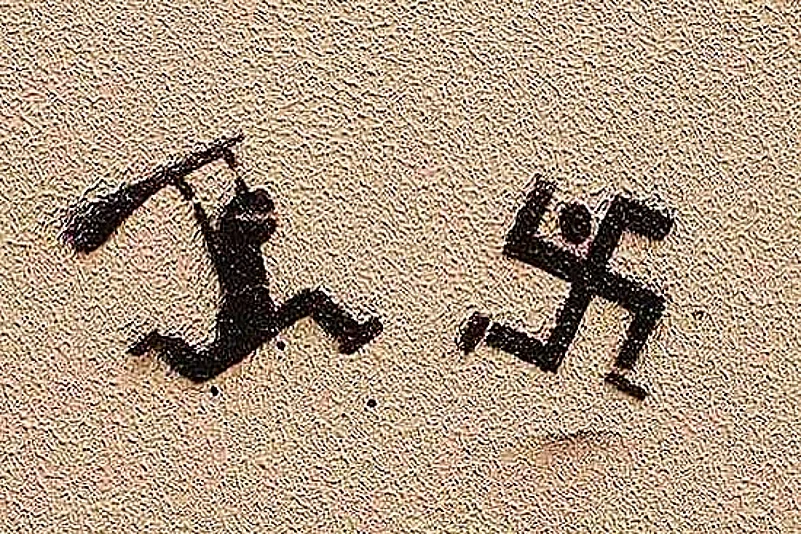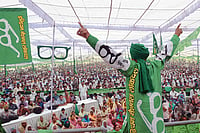FIR-ING LINE
- The 14-page FIR on the gas-pricing scam names Mukesh Ambani (above) and his RIL, among others.
- It said RIL gold-plated costs, produced less, refused to return gasfields. Alleged collusion and graft on part of the UPA govt.
- RIL and Centre approached the Delhi High Court to get FIR quashed; court allowed probe, but restrained possible arrests.
- Modi govt cut ACB’s powers. But FIR valid, as order not retrospective.
- Kejriwal may push case ahead
***
One of the first things the AAP government in Delhi is likely to do on taking charge is review the progress of an FIR against Reliance Industries Ltd (RIL) it had filed a year ago. At that time, Arun Jaitley, now the Union finance minister, had said he was all for an investigation of the industrial giant. But the Narendra Modi government of which he is part now has since taking charge tried to have the FIR quashed. The Delhi High Court, however, has frustrated those efforts, recently ordering the investigation to continue—and the case is set to become a cause celebre.
In February last year, when Arvind Kejriwal of the AAP stepped down from office on Valentine’s Day after 49 tumultuous days as chief minister, one of his actions in the last few days had been to order an FIR against Mukesh Ambani—RIL owner and the richest Indian—and then petroleum minister M. Veerappa Moili. The allegation was that gas pricing had been rigged, causing profit to RIL and a multi-billion dollar loss to the exchequer. Kejriwal, who is being sworn in as chief minister again on Valentine’s Day, after a near-wipeout of the BJP and the Congress, has plans to take the FIR ahead. While the FIR has been lodged with the Delhi government’s anti-corruption branch (ACB), considered inactive and toothless, the political push might make a difference, especially when the high court has given the green light.

The FIR had been filed after four eminent citizens—former cabinet secretary T.S.R. Subramaniam, former navy chief Admiral R.H. Tahiliani, former revenue secretary E.A.S. Sarma and Supreme Court lawyer Kamini Jaiswal—complained to Kejriwal. They provided substantive documentary support to back their allegation that senior government functionaries in the petroleum ministry, in collusion with RIL, manipulated gas pricing policy, allowing RIL to benefit to the tune of Rs 1.2 lakh-crore. The CM had passed the papers to his advisor N. Dilip Kumar, a retired ips officer, who worked overnight and wrote the next morning that since the CBI and the ACB of Delhi government had concurrent jurisdiction over Delhi, and since the CBI had taken no note of the matter, the ACB could be asked to investigate. He went on to add: “...it seems that the government is being run by Sh. Mukesh Ambani, RIL, through proxy to suit his greed...it needs thorough investigation.” A 14-page FIR was filed on February 11 last year, alleging that the Congress-led UPA had favoured RIL with an eye on the 2014 general elections and the BJP was maintaining silence hoping to gain funding for the polls. It says RIL gold-plated costs, deliberately dropped production to suit itself and did not relinquish the gasfields, as required by the agreement and aimed at preventing private parties from hoarding natural resources. Specific charges include cheating, criminal conspiracy and corruption.
It says: “RIL had signed a contract with NTPC in 2004 to supply gas for its power plants at $2.34 per mmbtu for a period of 17 years...however, RIL went back on its word and refused to supply the gas at that rate, which was clearly profitable for RIL...under RIL’s pressure, the government, with Mr Murli Deora as minister, revised gas price in 2007 to $4.2 per mmbtu, which was clearly mala fide and an act of corruption.” Significantly, “the Supreme Court in 2010 held that price fixed by the government would be binding on all the parties.” The FIR alleged the cost of production at the well-head was never calculated by the government or the Rangarajan committee, set up to formulate pricing. It took note of how there was no explanation for setting the price in dollars when the entire production was destined for use in India. RIL, of course, dismissed the FIR as shocking and denied the “irresponsible allegations”.
Why can’t companies produce gas at lower prices in India like they do it elsewhere? It’s a big question. And Kejriwal had asked why RIL’s own partner, Niko, could have a 25-year contract with Bangladesh to supply gas at $2.34 per unit. At that time, Moily had retorted that if Kejriwal could bear the difference, he’d be happy to reduce the price. In the next three days, in a rare act of solidarity, the BJP and the Congress stalled the assembly. The AAP government could not table even its vaunted Jan Lokpal bill. After some drama over other incidents as well, Kejriwal had resigned.

Days later, on February 20, Lt Governor Najeeb Jung, who took charge of the Delhi government, had two visitors: RIL executive director P.M.S. Prasad, accompanied by senior officials of his corporation; and, separately, Anil Ambani, chairman of the Reliance Anil Dhirubhai Ambani Group (ADAG), which runs BSES Rajdhani and BSES Yamuna, power distributors in Delhi. Kejriwal had ordered CAG audits of the discoms, accusing them of blackmail with threats of 10-hour power cuts. The Lt Gov’s office described these hours-long meetings as courtesy calls.
Jaitley has said he’s all for investigation, but not by means of the FIR. “I’ll be very happy if the court (the SC, where two pils on the issue are pending) orders a criminal investigation into it. But this process (the ACB’s FIR),” he says, “will break down constitutional and organisational structures.” Then solicitor-general Mohan Parasaran pronounced the FIR illegal and advised the Centre and others named in the FIR (that includes RIL) to approach the high court or the SC to have it quashed. Both RIL and the government did so, in the Delhi High Court, pushing the line that the ACB had no jurisdiction over them. Senior advocate Abhishek Manu Singhvi, of the Congress, appeared for the RIL and told the court the FIR was meant to score political points and humiliate some persons. The ACB, on its part, told the court in June 2014 that it was well within its right to lodge the FIR and that RIL’s plea for quashing the FIR, as “absurd” and “misconceived”. The court issued a restraint order—preventing possible arrest of Mukesh Ambani and the others—but allowed the ACB to proceed with its investigations.

Jaitley’s take Wants it investigated, but not by ACB. (Photograph by Jitender Gupta)
Now, the Union home ministry, under Rajnath Singh of the BJP, has issued a notification clipping the ACB’s power: the ACB can investigate cases of corruption only against functionaries of the Delhi government, not those of the Centre. But since the notification doesn’t have retrospective effect, the old FIR stays alive, additional commissioner P.C. Hota, in-charge of the ACB, confirmed.
Though it may be an organisation that limps, and may be out of its depth in investigating a matter as complex as gas pricing, Kejriwal had then planned to create a ten-member panel of experts to help the sleuths with their work. That’s likely to happen soon now.
There will be many red faces in powerful circles that AAP leader Prashant Bhushan describes crony capitalists. “All these years, Kejriwal was treated like a flea in the ear. Now, he’s become a monster,” says a former UPA minister and lawyer, forcing a smile. “BJP ke bhi achchey din aa rahen hain.”






















